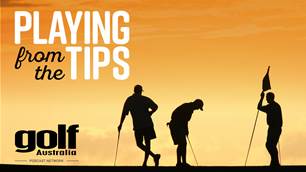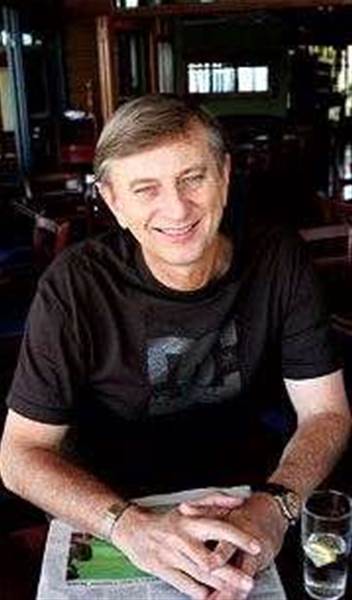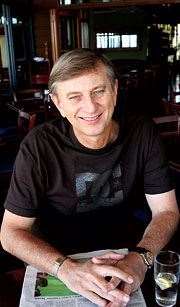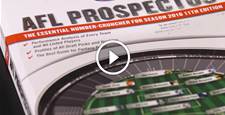Even by the exacting standards of the common AFL fan, Dennis Cometti is considered the very best AFL commentator in the land.
Even by the exacting standards of the common AFL fan, Dennis Cometti is considered the very best AFL commentator in the land.
Notable for turning a deft phrase (“Barlow to Bateman. The Hawks are attacking alphabetically … ”) when the occasion demands, Cometti also prides himself on accuracy and knowledge. Graham “Polly” Farmer writes in the foreword to Cometti’s book, Centimetre Perfect, that Dennis was himself a footballer who was good enough for the rest of the world to know about it. He was also an excellent cricket commentator before he settled on his first love, football.
This year, Cometti has returned to channel Seven with the blessing of his bosses at Nine (he joined them in 2002 when they won the AFL telecast rights) and – this is a mark of the man – made no enemies in the process. Although his descriptions and his vocal qualities remind us vaguely of commentators of the past, he brings something of the best of those times to modern commentary. More power to him.
You seem to have a great respect for good journos, especially writers like PJ O’Rourke and Hunter S. Thompson. How does that carry over into footy commentary?
I enjoy the way they use language so even the most straightforward thing can be mildly amusing. They have a sense of the absurd. And if there’s anything that lends itself to that, it’s football and football supporters. We’re all crazy. And sometimes a very mundane word in the right place can bring a smile or a reaction. It can be disarming and still maintain the tension. The best commentators seem to rise to the top because their persona is almost one they’ve chosen, because I often think they’re good enough to be something else. I like to do it so it looks as though I’ve put time and effort into it.
You were a DJ in Perth a long time ago. Do you still like your music?
Yeah, I was a top-40 DJ in Perth and Melbourne, briefly. In fact, everywhere I worked was briefly. In those days you got a gold watch if you worked anywhere for over six months. It was turbulent, but lots of fun. I still buy a lot of CDs, download a lot of stuff off the net. Very much today’s music. I’m not so much into rap or hip-hop, but there’s a lot of good music around. It’s probably the best it’s ever been.
How many games did you play for West Perth?
I reckon I played about 40. I started young and finished young. I was an only child and my old man passed away at the beginning of 1969. I’d had a very good year in ’68. I really found radio a lot easier than the application required for footy and I just sort of drifted.
You went to Melbourne to play for Footscray. What happened there?
I played in Footscray in ’71. I hadn’t played the year before, and I was injured the year before that, and it was only spasmodic at West Perth anyway. I’d taken a job at 3DB, which was owned by the Herald-Sun. It was a quasi-rock station. Talk during the day, and they were looking for someone to do rock at night, which was me. So the football thing was never going to work. That was a deal worked out between West Perth and Footscray, but I had to leave training at 6.15pm to be on air at 7pm.
Ted Whitten used to throw his head back and laugh when he saw me leaving for work when they were just starting their training. It was a strange situation. I had no inkling of playing football when I went to Melbourne. I needed a job because I’d been fired from the station I was working at in Perth and, somehow, footy got tacked on the end of it. Obviously West Perth wanted something or owed something to Footscray. If they owed something, they didn’t repay the debt.
I played about six or seven reserves games for Footscray. I missed the first month. Believe it or not, there was a clearance wrangle. Not sure what that was about, but I was impressed. I used to like reading about the clearance wrangle I was involved in. It sounded as though I could play, and I didn’t have to do anything. I just needed it to go on for 22 weeks. But Polly Farmer was my coach at West Perth and Ted Whitten at Footscray. Two of the all-time great players and great blokes. I did let the clubs down, but it was also a difficult time in my life, around the time Dad died.
You also coached in Perth for a few years. What sort of insights did you gain as a footy coach that you can bring to the microphone?
Well, I was a playing and non playing coach. It gives you a terrific insight into how football clubs run. Supporters and coaches, because they don’t play, have all the hangover of losses and all the bitterness that goes with it for a much longer time. Players go out and give their all, and if you’ve lost, there’s not much you can do about it. Players cleanse themselves by actually playing, but the feelings of whole cities and suburbs ride on winning and losing.
Which coach do you respect today?
I love Paul Roos’ attitude. You don’t want an emotional coach. People making decisions need to be clear-headed. I just love his attitude. He’s like a bloke who’s gone out to get the mail in the morning. He just saunters around. Rodney Eade is a bit more emotional, but he’s good. But I respect them all. I just like the way those two go about it. But I can’t really pick favourites.
You have a great store of aphorisms and sayings, but seem to drop them in at just the right time. Are some more spontaneous than others?
I suppose the breakdown is 50-50. But even the spontaneous ones have been floating around. Now and then, something suddenly just hits you. Football is predictable in a way. The more you see of it, the more you realise there’s a tempo to it that’s a bit like dancing and music. Certain things are going to happen in every game. The sequence might be different, but they’re going to come. If you’re patient, you’ll find a spot and you know going in what that spot is and where it will be.
It’s obvious that you enrich your knowledge with interests outside of football. What are they?
We’re very close as a family, my daughter Ricki and son Mark – he’s had to live with the fact that I couldn’t call him handpass or kick. I’ve asked them to try and keep me contemporary. We have music in common. Mine is probably one of the first generations to have music in common with its kids, particularly if you’re happy to go along with what’s happening now. If I start to waffle on and get nostalgic, they quickly bring me into line. We’re probably out for three or four meals a week as a family. It all keeps you abreast of what’s going on. I can talk to my peers as well about the past, but that’s not a growing audience. If you want to grow the audience and remain topical, younger people add to those who have grown up with you.
Who are the best commentators to work alongside?
Richie Benaud is probably the only bloke I broadcast with who I find intimidating, and I’ve shared the booth with prime ministers. He’s just outstanding. The way he conducts himself, everything. I’ve always admired Bruce as well. I had a lot of fun with Dermott and Gary. Wally Foreman. I don’t want to leave anybody out.
Who was the best footballer to come out of Perth?
I’d say Graham Farmer.
Who was the best you’ve ever seen, anywhere?
Leigh Matthews. Chris Judd is closing quickly. I have a tremendous regard for him. He and I own a horse together but, unfortunately, he’s faster than the horse. But the only thing that separates Matthews and Judd is time. Matthews was a great player for such a long time. Chris is on the way.
Are you glad to be back at Seven?
It’s comfortable. I was there for 15 years. A lot has changed and a lot hasn’t. I had a great five years at Nine. If you’re around quality people, it doesn’t matter what the number is. It happens to be Seven. I’m really looking forward to it. We’ve got our work cut out, because Nine did a really good job. I’m sure Seven can match if not surpass it.
Related Articles
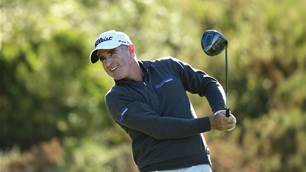
Video interview: Drinks With ... Matt Millar
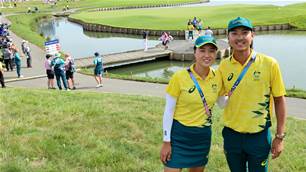
Min Woo backs Minjee to win the medal that eluded him
